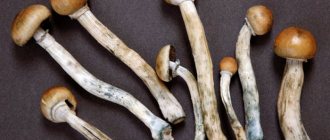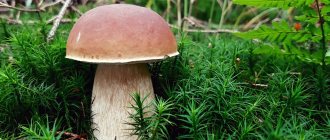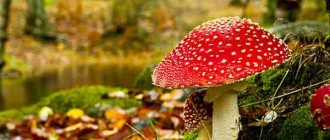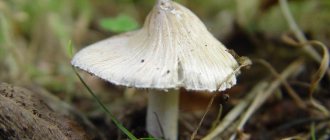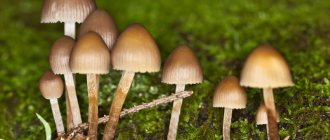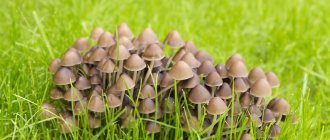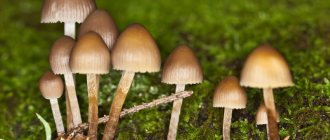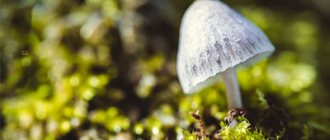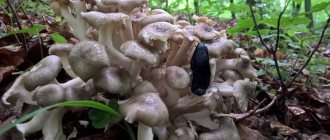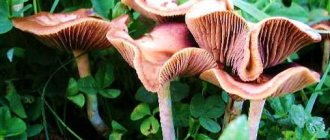What is psilocybin? It has a different designation - 4-phosphoryloxy-N,N-dimethyltryptamine, found in psilocybe, strafaria, panaeolus, anellaria and a few other species. It is an alkaloid, the chemical formula of which is C12H17N2O4P.
In other words, it is a chemical compound contained in certain types of inedible saprophytic mushrooms that are cosmopolitan, that is, widespread throughout almost the entire globe. The areas in which these mushrooms can be found are very diverse: soil, swamps, dead parts of other plants, manure, and peat. It is considered a narcotic, hallucinogenic drug.
Call us now:
8
Prices for Ultramed clinic services
Content:
- Characteristic
- Application
- Action
- Microdosing
- What is the problem
- Side effects
- Consequences
Psilocybin is a naturally occurring hallucinogen found in some types of mushrooms. Can be produced in a laboratory manner. It is an element of traditional shamanic practices. In medicine in a number of countries it is used in the treatment of neurotic disorders. Used by drug addicts to achieve psychedelic effects similar to those of LSD. Microdoses of psilocybin have been tried to improve mental function.
Mushroom psilocybin - what is it?
The traditions of eating magic mushrooms, preserved by the Indians, in the 60-70s of the last century spread throughout all states of the United States and moved to Europe.
About 200 psilocybin mushrooms are found in the wild in different countries. Psychedelic effects occur when eaten fresh or dried. The traditional form of consumption remains mushroom tea, which exerts its effect within 10 minutes. This is because when heated with water, psilocybin immediately turns into psilocin. Whereas when consuming mushroom fruiting bodies, the substance is dephosphorylated in the intestines to psilocin. This requires at least 40 minutes. However, certain types of mystical mushrooms may contain a ready-made psychedelic.
To exhibit a hallucinogenic effect, 1-14 mg of the active substance is sufficient. Mushroom psilocybin is a drug that is not particularly toxic. But it has an extremely powerful effect on serotonin receptors, copying the effect of the joy hormone. Experienced drug addicts place it in the middle between LSD and cannabis in terms of its effect on the psyche and euphoric manifestations.
Treatment for mushroom addiction
consultation with a narcologist at home and in hospital
withdrawal symptoms
We work around the clock
Free consultation Leave a request and we will call you back in 1 minute
8
Or call
Characteristic
Psilocybin is naturally found in Psilocybe Cubensis and some other mushrooms. The possibility of growing indoors simplifies the illegal distribution of “psilocybin” both in Russia and abroad. Due to its psychedelic effects and ability to alter consciousness, it has long been used in shamanic and recreational practices.
“Magic” mushrooms were used during initiation. They were taken during religious rituals and used to achieve trance states. There is archaeological evidence of the use of such mushrooms in Africa, the Middle East and pre-Columbian America.
Application
During active experiments with the subconscious in psychotherapy, psilocybin was used as a drug that could resurrect repressed memories. With the correct dose selection, the drug activates affective (feeling-related) memory, as a result of which a person experiences past events as if they were happening right now. This helped specialists establish the causes of neuroses. Currently, the technique has lost its relevance.
However, scientists point to the potential of the compound in the treatment of mental disorders and the need for further research to determine the scope of its possible use. According to American experts, psilocybin turned out to be effective in pre-suicidal states , severe fear of death and severe depression, and helped improve the quality of life and emotional state in the last stages of cancer.
Psilocybin is actively used illegally due to its psychoactive effect. In terms of its effects, it resembles LSD, but differs from it in the greater severity of mental changes that persist for 4–7 hours after administration.
Microdosing
The concept is based on the idea of taking small doses of a psychedelic drug to improve emotional state and cognitive functions while maintaining the adequacy of perception and the ability to act within the framework of normal life. The drug is supposed to improve productivity, help with stressful situations, severe anxiety and depressive disorders.
Proponents of microdosing argue that different types of mushrooms provide different effects. In addition, the result of consumption depends on body weight, general condition, time since the last meal and many other factors. Taking these circumstances into account, even fans of the method advise being careful not to combine psilocybin with alcohol, nicotine and other psychotropic drugs. According to the popularizers of the idea, after taking a microdose the following is observed:
- it becomes easier to focus on current tasks;
- sleep and wakefulness are restored;
- outlook on life becomes more optimistic;
- the level of motivation for work and active actions increases;
- the identification and ranking of priorities is simplified;
- social skills, attention, and creativity improve;
- minor psycho-emotional disorders disappear.
Signs of use
Conventionally, the state of a person who has used the drug psilocybin can be divided into several phases, and each of them exhibits characteristic signs.
- First phase.
It can occur within a period of ten to twenty minutes, depending on the amount of the substance consumed. At first, a person may feel some not very pleasant symptoms, such as a feeling of causeless anxiety, fear, a feeling of stupefaction, heaviness in the limbs, tingling, numbness, dizziness and even fainting. Then sweating and some loss of coordination, increased heart rate and dilated pupils are added to this. Hearing and visual perception become more acute, color perception changes, and a person seems to be “attacked” from all sides by external irritating factors.
A person being in this state goes inside himself, he constantly listens to his new sensations, the connection with reality is lost. Such a person will be extremely reluctant to talk with other people, answer their questions in monosyllables, and will not show any initiative to maintain contact with others.
- Second phase.
In it, a person begins to have various visions and hallucinations. Their character can vary, from unpleasant to whimsical and joyful. The nature of fantasies will depend on the inner world of the person himself; it is extremely difficult to predict their nature and development. The reactions of people in this state may be completely inexplicable to others. Logical thinking becomes dulled, as a result of which solving even the simplest problems becomes barely possible.
- Third phase.
The patient exhibits extreme passivity, lack of interest in the environment, and a low level of emotionality. The concepts of space and time have no meaning for him. In some foreign articles devoted to this issue, such conditions in people are called out of the body. The effect of psychotropic substances, in particular psilocybin, can last up to several days, it is expressed in a more peaceful state. Sometimes the increase in susceptibility to external irritating visual and auditory factors continues.
What is the problem
Firstly, psilocybin is one of the narcotic substances prohibited in Russia. Its use can lead to problems with the law, regardless of the dose and purpose of use. Secondly, the effects of the same dose in different people depend on many factors that cannot always be determined. Consequently, there is a risk of “overdoing” the quantity, even if you follow all the recommendations published on the relevant websites. Third, hallucinogenic mushrooms are toxic and addictive.
Psilocybin - fatal consequences of use, help with overdose
Even after long-term use of mushrooms, a person does not develop physical dependence. The transition occurs quite smoothly and does not cause the development of withdrawal symptoms. It is not the mushrooms themselves that negatively affect physiology, but other types of toxic substances, often leading to severe poisoning.
Psilocybin, as a drug, when taken for a long time, leads to serious mental and behavioral disorders, and also causes paranoia, leading to personality disorder. There is also a negative impact on:
- Heart and blood vessels.
- Kidneys.
- Gastrointestinal tract.
An overdose of mushrooms is quite rare, however, if you encounter this, you need to urgently seek help. First of all, you need to call an ambulance and make sure that the patient has enough air.
Next, you need to check the presence of a pulse and the reaction of the pupils. If there is no reaction and there is no heartbeat, it is necessary to perform an indirect cardiac massage and perform artificial respiration.
Despite all their harmlessness, hallucinogenic mushrooms do not bring anything good to a person, and therefore if you suspect that your friends or loved ones have become their next victim, seek help immediately.
Side effects
Along with realistic hallucinations, a feeling of bliss and an altered vision of oneself (from “going beyond the body” to “absolute dissolution in space”) in standard dosages used to achieve narcotic effects, users experience:
- causeless aggression;
- fainting, loss of strength;
- trembling of limbs;
- increased body temperature;
- tachycardia.
People microdosing psilocybin report nausea, spikes in blood pressure, palpitations, feelings of cold or heat, and mental state changes reminiscent of the feeling before an airplane takes off.
Consequences
When used regularly, the substance causes severe mental dependence, which can cause increased anxiety and suspiciousness, suicidal thoughts, depression and risky actions. Over time, intellectual abilities deteriorate and personality disorders form. Possible psychosis.
On the part of the body, the digestive system suffers the most. Due to the high toxicity of mushrooms, liver function is disrupted and hepatitis may develop. In the long term, the risk of cancer of the stomach and intestines increases.
Considering all of the above, taking psilocybin even in small doses seems unreasonably risky. There may be ways to use the drug to improve the cognitive and emotional components of the psyche. But they have not been sufficiently developed, and safe options are not yet known for sure. You should not become a guinea pig and conduct experiments on yourself, risking your health.
The effect of the substance on the body and the development of addiction
The mechanism of action of the alkaloid on the human body has been studied in some detail. When it enters the intestines and then into the blood, it irritates serotonin receptors, and therefore the person who takes the drug develops a feeling of joy and euphoria.
As for the effect on the brain, mushrooms affect several centers at once, namely:
- Cingulate gyrus (posterior and anterior parts).
- MPZ.
These parts of the brain are constantly in a state of active activity. In these areas, all news flows are formed into a single whole, creating a picture of the world for each individual person. After the influence of the drug, neurons located in this area stop working and, as a result, metabolic processes are suspended. Due to such changes in the brain, hallucinations occur.
As for the anterior part of the gyrus, it is responsible for the development of depressive moods. Thus, the alkaloid inhibits the work of neurons in this area, which is why people often improve their mood and lose anxiety.
With regular use of the drug, a rather strong mental dependence develops. In general, it can be represented as follows:
- Taking a drug.
- Activation of the reward zone.
- Feeling of pleasure.
- Memory of euphoria.
- The desire to experience euphoria again by taking a substance.
